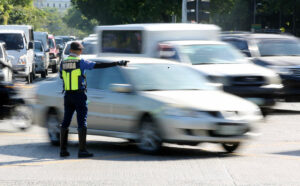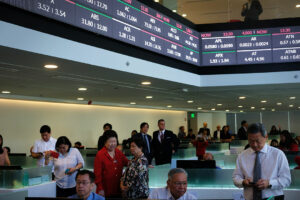Coordinated traffic solutions urged

THE GOVERNMENT should coordinate efforts to ease traffic congestion, especially in the Philippine capital to minimize disruption to businesses, according to the American Chamber of Commerce of the Philippines (AmCham).
“Heavy traffic and uncoordinated traffic policies can definitely be disruptive to the conduct of business. It contributes to higher costs in the movement of goods and negatively affects the well-being of the workforce,” Ebb Hinchliffe, AmCham Philippines executive director, told BusinessWorld in a Viber message on Sunday.
His remarks came on the heels of the Metropolitan Manila Development Authority’s (MMDA) banning of e-bikes, e-tricycles, and other light vehicles on major roads. Three days after its implementation last week, President Ferdinand R. Marcos, Jr. ordered a grace period of one month until May 18 to properly inform those affected before it is implemented.
Mr. Hinchliffe said that while heavy traffic may mean high economic activity, there should be sound policies that mitigate it.
The MMDA said road apprehensions will continue, but no traffic violation tickets will be issued until May 18.
In a phone call with BusinessWorld, British Chamber of Commerce Executive Director and Trustee Christopher James Nelson said there is a waste of productive time spent sitting in Metro Manila traffic.
He voiced out the need for an overall traffic plan, not just for Metro Manila, but for other major cities in the country.
“There are conflicting policy directions between National Government Agencies–especially in the case of DoTr (Department of Transportation), DPWH (Department of Public Works and Highways), and MMDA,” AltMobility PH Director Ira F. Cruz said in a Viber message to BusinessWorld.
He said the DoTr has an Active Transport Office that promotes active transportation in the country. While DPWH has guidelines that “downgrade bike lanes as the lowest level on roads where bike lanes are most needed.”
Mr. Cruz said his group welcomes Mr. Marcos’ order to create a comprehensive plan to mitigate traffic.
“The ban on e-trikes is simply an example of a piece-meal “solution.” What we need now is a comprehensive plan that will start chipping away at the country’s transportation issues,” he added.
He suggested the President tap the DoTr as the leader of this plan and involve non-governmental organizations and transport industry representatives.
MOVING FORWARDMr. Hinchliffe said his organization recommends “the promotion of walkability and the use of non-motorized forms of transportation through the provision of pedestrian facilities and networks of greenways and bikeways as well as the implementation of smooth intermodal transport systems.”
While Mr. Nelson said the Philippines is the gateway to Southeast Asia, so the government must invest in infrastructure.
“[Foreign businesspeople’s] first view is the airport, and then obviously it’s [their] transport into [their] hotel or accommodation. So, an improved transportation system would definitely give a better view [of the Philippines],” he added.
He said that an improved transportation system in the Philippines can be more appealing to foreign investors.
“Traffic management and improvements in roads, and forms of public transport or transport is a critical arm, and it will assist economic growth,” he added. — Chloe Mari A. Hufana




